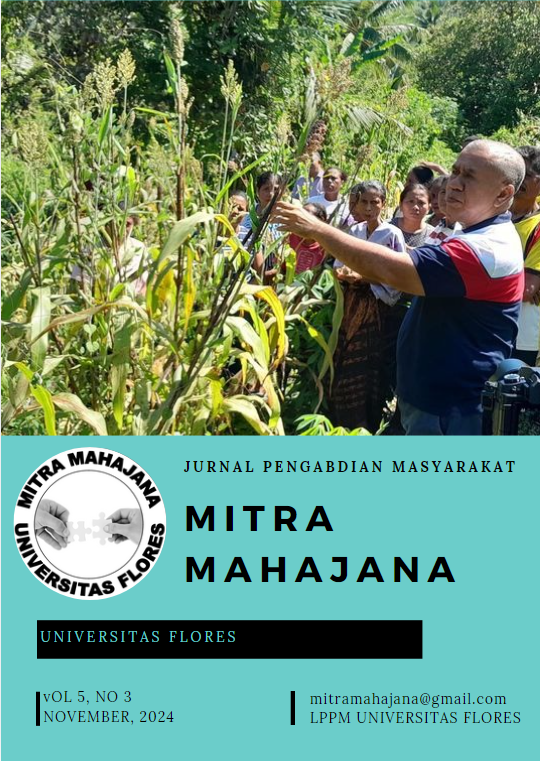PELATIHAN DASAR KEWIRAUSAHAAN BERBASIS TEKNOLOGI INFORMASI DI SMKN 2 DENPASAR
DOI:
https://doi.org/10.37478/mahajana.v5i3.4533Abstract
The digital era, opportunities for students to learn about entrepreneurship. With the advent of information technology such as smartphones and laptops, starting entrepreneurial activities has become more accessible for students. SMKN 2 Denpasar is one of the schools implementing and supporting entrepreneurship education. This program aims to instil an entrepreneurial spirit in students and enhance their foundational business knowledge and mindset on starting a business from scratch. The methods used in this program include imparting an entrepreneurial mindset, utilising the Business Model Canvas (BMC) to analyse and plan business models, managing business finances to effectively control financial resources, and creating digital content for marketing through social media. The results indicate that students responded positively and found the entrepreneurship learning beneficial, as evidenced by the questionnaires completed by students regarding the IT-based entrepreneurship training they participated in.
Downloads
Keywords:
entrepreneur, information technology, business mindset, business model canvas, content marketingReferences
Aswandy, E., & Mariyanti, T. (2022). Analisa Pengaruh Teknologi Informasi & Komunikasi terhadap Kewirausahaan dan Kinerja UMKM. Jurnal STEI Ekonomi, 31(01), 76-89. https://doi.org/10.36406/jemi.v30i01.624
Capiña, M. V. (2021). Impact of Management Practices on Micro and Small Enterprise (MSEs) Performance in Marinduque, Philippines. Journal of Social Entrepreneurship Theory and Practice, 1(1), 84–97. https://doi.org/10.31098/jsetp.v1i1.561
Duckworth, A. (2023). Grit: Kekuatan Passion dan Kegigihan. Indonesia: Gramedia Pustaka Utama.
Hammoda, B. (2024). The impact of educational technologies on entrepreneurial competencies: A systematic review of empirical evidence. Knowledge Management & E-Learning, 16(2), 309-333. https://doi.org/10.34105/j.kmel.2024.16.015
Hutamy, E. T., Marham, A., Alisyahbana, A. N. Q. A., Arisah, N., & Hasan, M. (2021). Analisis Penerapan Bisnis Model Canvas pada Usaha Mikro Wirausaha Generasi Z. Jurnal Bisnis Dan Pemasaran Digital, 1(1), 1-11. https://doi.org/10.35912/jbpd.v1i1.453
Jefferson, S., & Tanton, S. (2015). Valuable content marketing: how to make quality content your key to success. London: Kogan page publishers.
Kaban, R. F., Hania, I., Widjaja, H. S., & Lubis, Z. (2024). The Effect of Digital Marketing on The Performance and Sustainability of Food MSMEs In Jakarta During The Covid-19 Pandemic. Jemasi: Jurnal Ekonomi Manajemen dan Akuntansi, 20(1), 17-27. https://doi.org/10.35449/jemasi.v20i1.748
Prempeh, A. , Osei, B. , Osei, F. & Kuffour, E. (2022). Accounting Records Keeping and Growth of Small and Medium Enterprises in Kumasi Metropolitan. Open Journal of Social Sciences, 10, 184-207. https://doi.org/10.4236/jss.2022.1013015
Silitonga, N., Asbari, M., & Chidir, G. (2024). Analisis Pengaruh Karakter Personal dan Sikap Mahasiswa terhadap Digital Entrepreneurship. Journal of Information Systems and Management (JISMA), 3(1), 106-119. https://doi.org/10.4444/jisma.v3i1.1113
Siregar, L. Y., & Nasution, M. I. P. (2020). Perkembangan teknologi informasi terhadap peningkatan bisnis online. HIRARKI: Jurnal Ilmiah Manajemen Dan Bisnis, 2(1), 71-75. https://journal.upp.ac.id/index.php/Hirarki/article/view/331
Vygotsky, L. S. (1962). Thought and Language. Cambridge: MA, MIT Press.
Zhang, Z. (2021, April). The impact of digital technologies on entrepreneurship education. In 2021 6th International Conference on Social Sciences and Economic Development (ICSSED 2021) (pp. 448-452). Atlantis Press. https://doi.org/10.2991/assehr.k.210407.088
Downloads
Published
How to Cite
Issue
Section
License
Copyright (c) 2024 I Gede Putu Krisna Juliharta, Ni Luh Putu Ning Septyarini Putri Astawa, Ketut Queena Fredlina, Putri Anugrah Cahya Dewi, Romiza Zildjian, I Komang Suartama

This work is licensed under a Creative Commons Attribution-ShareAlike 4.0 International License.
The authors and other parties are bound to the Attribution-ShareAlike 4.0 International license (CC BY-SA 4.0 DEED) for the published articles. This permits users to:
Share — copy and redistribute the material in any medium or format for any purpose, even commercially.
Adapt — remix, transform, and build upon the material for any purpose, even commercially.
The licensor cannot revoke these freedoms as long as you follow the license terms.
Under the following terms:
Attribution — You must give appropriate credit , provide a link to the license, and indicate if changes were made . You may do so in any reasonable manner, but not in any way that suggests the licensor endorses you or your use.
ShareAlike — If you remix, transform, or build upon the material, you must distribute your contributions under the same license as the original.
No additional restrictions — You may not apply legal terms or technological measures that legally restrict others from doing anything the license permits.






